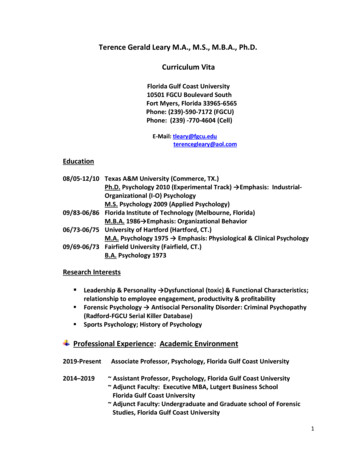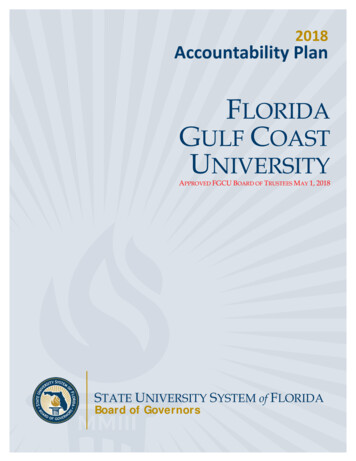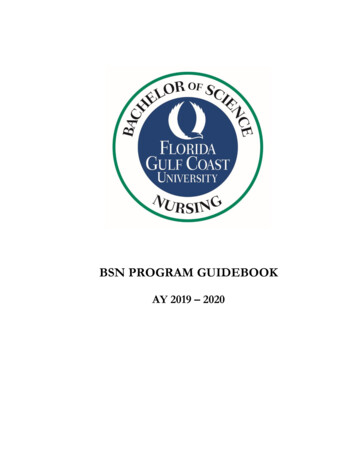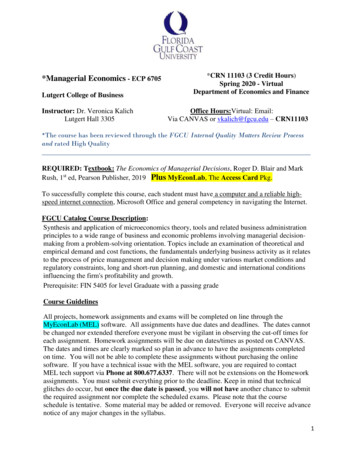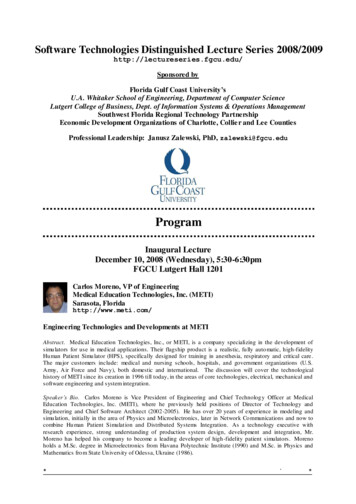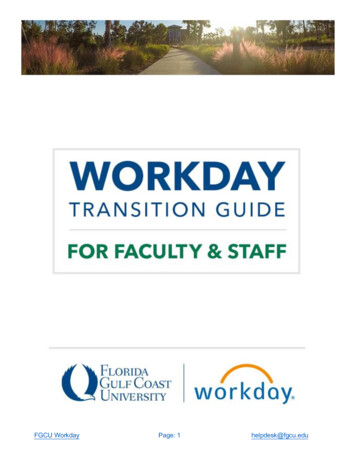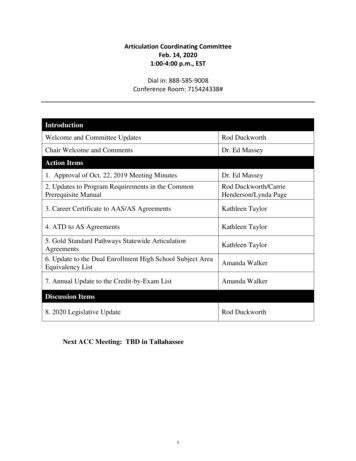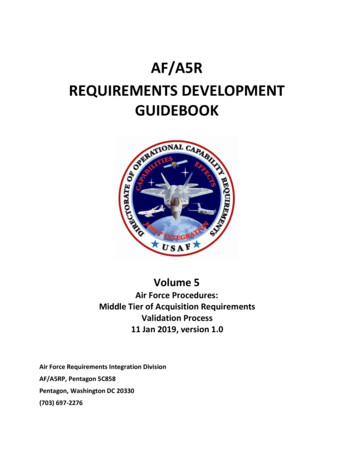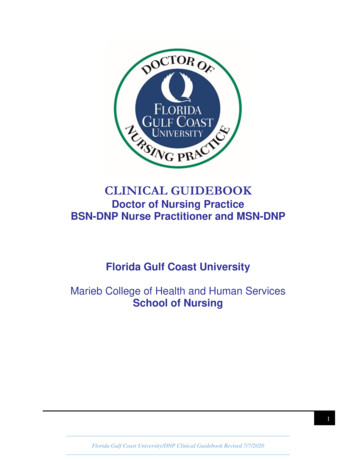
Transcription
CLINICAL GUIDEBOOKDoctor of Nursing PracticeBSN-DNP Nurse Practitioner and MSN-DNPFlorida Gulf Coast UniversityMarieb College of Health and Human ServicesSchool of Nursing1Florida Gulf Coast University/DNP Clinical Guidebook Revised 7/7/2020
CONTENTSProgram Director’s Welcome3Accreditation/Approvals4DNP Faculty and Graduate Staff5I.INTRODUCTION TO THE DNP PROGRAMSchool of Nursing Vision, Values, Mission & PhilosophyDNP Program OverviewDNP Program Student Learning OutcomesNurse Practitioner Core CompetenciesII.6-78910 – 12BSN-DNP CLINICAL PRACTICEGeneral GuidelinesStudent Roles and ResponsibilitiesFaculty Roles and ResponsibilitiesPreceptor Roles and Responsibilities13131414 – 15III. MSN-DNP and BSN-DNP CLINICAL PRACTICEGeneral GuidelinesDNP Essentials 1 – 8Student Roles and ResponsibilitiesFaculty Roles and ResponsibilitiesMentor Roles and ResponsibilitiesAttendance and PunctualityAPPENDICESAppendix A: On-Line Management Evaluation System (Typhon)Appendix B: Micro-Skills for Clinical TeachingAppendix C: Preceptor Evaluation of Nurse Practitioner Student Clinical PerformanceAppendix D: DNP Practice Preceptor/Clinical Mentor AgreementAppendix E: Preceptor/Mentor Curriculum Vita FormAppendix F: Guidelines for DNP Activities for Indirect DNP Clinical Practice HoursAppendix G: Safety Acknowledgement for Student Participation in In-PersonClinical Practice1617 - 202121222325262728 - 32333435-39402Florida Gulf Coast University/DNP Clinical Guidebook Revised 7/7/2020
Dear Preceptor/Clinical Mentor:Thank you for agreeing to serve as a preceptor/clinical mentor (Mentor) for a student enrolled inthe Doctor of Nursing Practice (DNP) Nurse Practitioner Program at Florida Gulf CoastUniversity. Your teaching, guidance, and mentorship are critical to a successful learningexperience. The clinical setting is where synthesis of concepts and application of principles forquality health care delivery are achieved. The student will work closely with you and throughyour supervision, the student will develop the knowledge and skills necessary to advance in theirprofessional role. Faculty will work closely with the student, preceptor/mentor to achieve courseoutcomes and evaluate the student’s progress. Communication will occur between the faculty,preceptor/mentor, and student through site visits, telephone or email correspondence. The studentwill contact you to arrange a convenient time to meet and review the course requirements,establish a clinical practice schedule, and develop mutually agreed upon goals.The Clinical Guidebook is based on the National Organization of Nurse Practitioner Faculties(NONFP) Competencies for Nurse Practitioners and Essentials of Doctoral Education forAdvanced Nursing Practice. The Clinical Guidebook provides a brief description of the DNPProgram and outlines the roles and responsibilities of students, program faculty, andpreceptors/mentors. Please review the Clinical Guidebook, and complete the DNP Preceptor/Clinical Mentor Agreement, and fax or email to me along with a current resume/curriculumvitae. Your timely response to these materials is critical for student success. The ClinicalGuidebook should be read in conjunction with the Doctor of Nursing Practice ProgramGuidebook, which is located on the School of Nursing Website. If there is a conflict in policies,the DNP Program Guidebook takes precedence.If you have any questions regarding your role or the clinical practice experience, please do nothesitate to contact me. Again, many thanks for your participation in this experience for thestudent.Sincerely,Loureen Downes, PhD, APRN, FNP-BCAssociate ProfessorDirector, Doctor of Nursing Practice ProgramPhone: 239-590-7449Email: ldownes@fgcu.edu3Florida Gulf Coast University/DNP Clinical Guidebook Revised 7/7/2020
Accreditation/ApprovalsFlorida Gulf Coast University is accredited by the Commission on Colleges of the SouthernAssociation of Colleges and Schools to award associate, baccalaureate, master's, and doctoraldegrees. Contact the Commission on Colleges for questions about the accreditation of FloridaGulf Coast University.The Doctor of Nursing Practice program in nursing at Florida Gulf Coast University is accreditedby the Commission on Collegiate Nursing Education. (http://www.ccneaccreditation.org)4Florida Gulf Coast University/DNP Clinical Guidebook Revised 7/7/2020
DNP FACULTY and GRADUATE STAFFNameAnne NolanTitleAssociate ProfessorDirector, School of NursingElizabeth A. and Jack A.Conner Professor in NursingContact Informationanolan@fgcu.eduLoureen DownesAssociate ProfessorDNP-Nurse PractitionerProgram DirectorAdministrative Specialist,Graduate Programsldownes@fgcu.eduImke CaseyAssistant Professoricasey@fgcu.eduPaula Davis-HuffmanChristina DziobaApril FeltonJayanta GuptaVirginia Londahl-RamseyJihan MahmoudLolita MelhadoElizabeth MurrayAssistant ProfessorAssistant ProfessorAssistant ProfessorAssociate ProfessorAssistant ProfessorAssistant ProfessorAssistant ProfessorAssociate ProfessorNurse Educator eduJohanna NewmanAssistant ProfessorAssistant NurseAnesthesiology ProgramDirectorAssistant ProfessorAssistant ProfessorDNP -Nurse AnesthesiologyProgram Directorjnewmann@fgcu.eduAssistant Professorchswayne@fgcu.eduGretchen WarnTammy SadighiRosann SpiegelCheryl .edu5Florida Gulf Coast University/DNP Clinical Guidebook Revised 7/7/2020
I.INTRODUCTION TO DNP PROGRAMSCHOOL OF NURSING VISION, VALUES, MISSION, ANDPHILOSOPHYVisionThe School of Nursing envisions a future where faculty and students serve as mentors and interprofessional role models to develop engaged nurse leaders who deliver transformative care todiverse populations, conduct research, and promote evidence-based practice through academic andcommunity partnerships. Approved April 2017Values1. Caringa. Value and exhibit a personal commitment of concern and empathy for patients,families, communities and self without biasb. Jean Watson: A caring environment is one that offers the development of potentialwhile allowing the patient to choose the best action for him or herself at a given pointin time2. Health Promotiona. Actively participate in a culture acknowledging wellness, prevention, wholeness,physical and mental health, incorporating the mind, body and spirit of patients,families, communities and selfb. Hochbaum, Rosenstock & Kegels’ Health Belief Model:A person’s health-related behavior depends on the person’s perception of severity of apotential illness, susceptibility to the illness, benefits of taking preventive action.barriers to taking that action, and self-efficacy3. Critical Thinkinga. Mindful judicious use of available knowledge and information to produce bestoutcomes for patients, families and communitiesb. Patricia Benner: Expert nurses develop skills and understanding of patient care overtime through a sound educational base and a multitude of experiences4. Cultural Connectednessa. Embrace diversity and uniqueness of patients, families, and communities whilerecognizing the importance of self-awarenessb. Madeleine Leininger: Culture refers to learned, shared, and transmitted values,beliefs, norms and lifeways to a specific individual or group that guide their thinking,decisions, actions and pattered ways of living5. Communicationa. Commitment to respectful interpersonal and interprofessional conveyance oftrustworthy, responsible, reliable and ethical information6Florida Gulf Coast University/DNP Clinical Guidebook Revised 7/7/2020
b. Hildegard Peplau: The six main roles of a nurse are stranger, teacher, resource person,counselor, surrogate and leaderMissionThe School of Nursing mission is consistent with the mission and goals of Florida Gulf CoastUniversity and the Marieb College of Health & Human Services. The School of Nursing strivesfor excellence in providing evidence-based, learner-centered nursing education that preparescompetent and compassionate nursing professionals to meet the ever-changing healthcare needsof diverse global communities.PhilosophyThe faculty of the School of Nursing believes that the practice of professional nursing rests upona sound arts and science foundation that prepares graduates to excel in a diverse, rapidlychanging, and technologically oriented society. Faculty members serve as guides, mentors, rolemodels, and facilitators for students to synthesize the roles and responsibilities of the scope ofnursing practice. Integrated and conceptually based curricula are built upon the principles ofcommunication, critical thinking, cultural-connectedness, health promotion, and adherence toprofessional and ethical standards of practice, which form the foundation for knowledge andskills essential for nursing professionals. Teaching and learning activities are keystones of thecurricula and occur within caring, interdisciplinary, and environmentally sensitive settings.Nurse Practitioner Program PhilosophyThe Nurse Practitioner Faculty believes that graduate nursing education builds upon thefoundation of undergraduate nursing education, and that application of communication, criticalthinking, cultural-connectedness, health promotion, and adherence to professional and ethicalstandards of practice within a rapidly changing, diverse and technologically oriented society areessential aspects of nurse practitioner practice. The Nurse Practitioner Program embraces patientcentered holistic care that is safe, competent, current and culturally sensitive. The NursePractitioner Faculty are committed to life-long learning, professional development, academicexcellence, scholarly inquiry, collegiality, collaboration, and cohesiveness. Approved April 20087Florida Gulf Coast University/DNP Clinical Guidebook Revised 7/7/2020
DNP Program OverviewThe Doctor of Nursing Practice Program prepares advanced practice nurses for leadershipclinical opportunities in a variety of evolving global health care environments. The ability tocreate innovative roles as wells as consolidate existing roles is a hallmark of graduates.Extensive practice experiences enable student-initiated opportunities that promote developmentof diverse knowledge, values, and competencies essential for advanced practice. Throughout theDNP Program, students are guided in the processes of self-development aimed at pursuingexcellence in scholarly and professional endeavors.The FGCU BSN-DNP Program offers specialty practice studies leading to eligibility as acertified Family Nurse Practitioner (FNP). The BSN to DNP studies also include the DNP corethat focuses on utilization of research in the practice setting, quality of care delivery,examination of health care outcomes, leadership in practice, and fundamentals of nurseeducation. The total credit hours required for Nurse Practitioner BSN to DNP major is 81 and aminimum of 1000 practice hours. The program can be completed in 8 semesters (3 years) offull-time study or 11 semesters (4 years) of part-time study.A MSN to DNP is available to candidates who have already completed a Master’s degree innursing from a nationally-accredited nursing program with a clinical specialty area. The MSNto DNP builds upon the candidate’s specialty practice area through a DNP core that focuses onutilization of research in the practice setting, quality of care delivery, examination of health careoutcomes, leadership in practice, and fundamentals of nurse education. The total credit hoursrequired for the MSN to DNP is 36 credit hours and a minimum of 1000 practice hoursincluding MSN clinical practice hours.8Florida Gulf Coast University/DNP Clinical Guidebook Revised 7/7/2020
DNP Program Student Learning Outcomes (DNP Essentials)At the completion of the program, graduates will:1. Collaborate with other healthcare professionals to provide high quality, ethical patientcentered care that meets current standards of best practice. (# 2)2. Lead inter-professional teams to design, implement, and evaluate clinical practicestrategies based on theoretical, scientific, and ethical knowledge. (#1, #2, #6)3. Integrate advanced critical reasoning and judgment in the management of complexclinical situations and systems in a selected area of advanced practice nursing andorganizational systems. (#8)4. Implement health care delivery models and strategies designed for increased safety andquality improvement in health promotion, clinical prevention and population health. (#2,#7)5. Employ evidence-based framework and information technology to evaluate and developstrategies and interventions to improve health status, access patterns, and identify gaps incare of diverse patients, populations, and organizations. (#1, #3, #4)6. Advocate for change in health care practice and health care environments through policydevelopment, implementation, and evaluation. (#2, #5, #8)9Florida Gulf Coast University/DNP Clinical Guidebook Revised 7/7/2020
Nurse Practitioner Core Competencies (National Organization of NursePractitioner Faculties, 2017)Scientific Foundation Competencies1. Critically analyzes data and evidence for improving advanced nursing practice.2. Integrates knowledge from the humanities and sciences within the context of nursingscience.3. Translates research and other forms of knowledge to improve practice processes andoutcomes.4. Develops new practice approaches based on the integration of research, theory, andpractice knowledge.Leadership Competencies1. Assumes complex and advanced leadership roles to initiate and guide change.2. Provides leadership to foster collaboration with multiple stakeholders (e.g. patients,community, integrated health care teams, and policymakers) to improve health care.3. Demonstrates leadership that uses critical and reflective thinking.4. Advocates for improved access, quality and cost-effective health care.5. Advances practice through the development and implementation of innovationsincorporating principles of change.6. Communicates practice knowledge effectively both orally and in writing.7. Participates in professional organizations and activities that influence advanced practicenursing and/or health outcomes of a population focus.Quality Competencies1. Uses best available evidence to continuously improve quality of clinical practice.2. Evaluates the relationships among access, cost, quality, and safety and their influence onhealth care.3. Evaluates how organizational structure, care processes, financing, marketing and policydecisions impact the quality of health care.4. Applies skills in peer review to promote a culture of excellence.5. Anticipates variations in practice and is proactive in implementing interventions toensure quality.Practice Inquiry Competencies1. Provides leadership in the translation of new knowledge into practice.2. Generates knowledge from clinical practice to improve practice and patient outcomes.3. Applies clinical investigative skills to improve health outcomes.4. Leads practice inquiry, individually or in partnership with others.5. Disseminates evidence from inquiry to diverse audiences using multiple modalities.6. Analyzes clinical guidelines for individualized application into practice.10Florida Gulf Coast University/DNP Clinical Guidebook Revised 7/7/2020
Technology and Information Literacy Competencies1. Integrates appropriate technologies for knowledge management to improve health care.2. Translates technical and scientific health information appropriate for various users’needs.a. Assess the patients’ and caregivers’ educational needs to provide effective,personalized health care.b. Coaches the patient and caregiver for positive behavioral change.3. Demonstrates information literacy skills in complex decision-making.4. Contributes to the design of clinical information systems that promote safe, quality andcost-effective care.5. Uses technology systems that capture data on variables for the evaluation of care.Policy Competencies1. Demonstrates an understanding of the interdependence of policy and practice.2. Advocates for ethical policies that promote access, equity, quality and cost.3. Analyzes ethical, legal and social factors influencing policy development.4. Contributes in the development of health policy.5. Analyzes the implications of health policy across disciplines.6. Evaluates the impact of globalization on health care policy development.7. Advocates for policies for safe and health practice environments.Health Delivery System Competencies1. Applies knowledge of organizational practices and complex systems to improve healthcare delivery.2. Effects health care change using broad based skills including negotiating, consensusbuilding, and partnering.3. Minimizes risk to patients and providers at the individual and systems level.4. Facilitates the development of health care systems that address the needs of culturallydiverse populations, providers, and other stakeholders.5. Evaluates the impact of health care delivery on patients, providers, other stakeholders,and the environment.6. Analyzes organizational structure, functions and resources to improve the delivery ofcare.7. Collaborates in planning for transitions across the continuum of care.Ethic Competencies1. Integrates ethical principles in decision-making.2. Evaluates the ethical consequences of decisions.3. Applies ethically sound solutions to complex issues related to individuals, populationsand systems of care.11Florida Gulf Coast University/DNP Clinical Guidebook Revised 7/7/2020
Independent Practice Competencies1. Functions as a licensed independent practitioner.2. Demonstrates the highest level of accountability for professional practice.3. Practices independently managing previously diagnosed and undiagnosed patients.a. Provides the full spectrum of health care services to include health promotion,disease prevention, health protection, anticipatory guidance, counseling, diseasemanagement, palliative, and end-of-life care.b. Uses advanced health assessment skills to differentiate between normal,variations of normal and abnormal findings.c. Employs screening and diagnostic strategies in the development of diagnoses.d. Prescribes medications within scope of practice.e. Manages the health/illness status of patients and families over time.4. Provides patient-centered care recognizing cultural diversity and the patient or designeeas a full partner in decision-making.a. Works to establish a relationship with the patient characterized by mutualrespect, empathy, and collaboration.b. Creates a climate of patient-centered care to include confidentiality, privacy,comfort, emotional support, mutual trust, and respect.c. Incorporates the patient’s cultural and spiritual preferences, values, and beliefsinto health care.d. Preserves the patient’s control over decision making by negotiating a mutuallyacceptable plan of care.e. Develops strategies to prevent one’s own personal biases from interfering withdelivery of quality care.f. Addresses cultural, spiritual and ethnic influences that potentially create conflictamong individuals, families, staff and caregivers.5. Educates professionals and lay caregivers to provide culturally and spiritually sensitiveappropriate care.6. Collaborates with both professional and other caregivers to achieve optimal careoutcomes.7. Coordinates transitional care services in and across care settings.8. Participates in the development, use and evaluation of professional standards andevidenced-based care.12Florida Gulf Coast University/DNP Clinical Guidebook Revised 7/7/2020
II.BSN-DNP PRIMARY CARE CLINICAL PRACTICEGENERAL GUIDELINESBSN to DNP student will engage in approved practice activities related to specific courses.Practice sites, Preceptors, and Mentors will be identified for students and approved by theProgram Director. Students may identify possible practice sites, Preceptors, and Mentors basedon appropriateness to the specific course and required learning outcomes with approval ofProgram Director.STUDENT ROLES AND RESPONSIBILITIES Students are expected to contact their Preceptor by phone prior to starting their rotations.Assist with completion of submitting required documents for Preceptor (s).Establish a mutually agreeable schedule in collaboration with faculty for practice timewith the Preceptor and complete Monthly Clinical Practice Schedule in Typhon.Arrive to the clinical practice experience prepared to perform in accordance with courselearning outcomes, individualized goals, and assigned learning activities after the firstday of class or by approval of Program Director and course faculty. Bring appropriateequipment to clinical site.Appropriate business casual attire with full-length white lab coat and name badge.Maintain currency of all DNP student program requirements.Follow policies and procedures established in the practice site and keep the Preceptorinformed of all learning activities.Maintain accurate records of practice time using Time Logs in Typhon. Time logs willnot be approved if a student does not indicate a 30-minute break was taken if hoursexceed 7 hours. In Time Logs, the student indicates time focused on DNP Essentials andDNP Program Outcomes. It is the student's responsibility to select the correct course,Preceptor, and clinical site.Enter all patient encounters in the case log, and the associated number of SOAP notesdetermined by the course faculty member, in Typhon.Students are required to log their cases and time log(s) on the same day as clinical.In the clinical setting, it is the expectation that notes are written on the same day foraccurate documentation and billing purposes. There will be an automatic seven-daylockout period in Typhon to enter cases and time logs starting from the encounterdate. Students will only receive credit for the hours and cases logged into Typhon.If a student is unable to enter cases and time logs into Typhon due to extenuatingcircumstances, they must notify the faculty before the end of the seven-day lockoutperiod. A student will not be able to enter cases/time after the seven-day lockout periodand may need to complete additional hours and/or receive an unsatisfactory grade.Students are expected to be engaged in the clinical learning process.13Florida Gulf Coast University/DNP Clinical Guidebook Revised 7/7/2020
Every clinical rotation and every clinical Preceptor have their own characteristics andmode of operation. The student should be able to adjust to the differences in the variousrotations in terms of patient flow, charting, methods of assessment, and patient caremanagement. From this diversity, the student will eventually derive his/her owntechniques and philosophy.Students must ensure that mid-term and final evaluations are completed by theirPreceptor in Typhon.Complete and submit Practice Site Evaluation and Student Evaluation of Preceptor atthe end of each practice course in Typhon.Students may use a maximum of 240 clinical hours for indirect clinical experiences,including online case studies, and simulation. Refer to Appendix F for Guidelines forDNP Activities Applicable to DNP Clinical Practice Hours14Florida Gulf Coast University/DNP Clinical Guidebook Revised 7/7/2020
FACULTY ROLES AND RESPONSIBILITIESThe Program Director and Course Faculty assume ultimate responsibility for student education.Faculty use several methods to ensure a successful practice experience for students, such ascommunication with the Preceptor, regular reviews of student work and practice journals,reviewing evidence from preceptors, direct observation of student, and evaluating assignments asoutlined in the course syllabus. Evaluate practice sites for appropriateness of learning experience.Evaluate Preceptor to ensure they are academically and experientially qualified for theirrole as Preceptor.Ensure Preceptor has the expertise to support student achievement of expected courseand program outcomes.Evaluate all documents related to the preceptorship, including Typhon logs.Arrange at least one joint conference with Preceptor and student.Provide immediate consultation and support of Preceptor, if necessary.Seek preceptor input regarding student performance.Document student progress and specify satisfactory/unsatisfactory completion of thepractice experience based on preceptor verbal input, Preceptor Evaluation of Student,and achievement of course-specific learning outcomes and program outcomes.Review Student Evaluation of Preceptor and Practice Site Evaluation at the end ofeach semester.For each preceptor and site complete Faculty Evaluation of Preceptor and Site by theend of each semester.Provide Preceptor (s) with an electronic copy of this Guidebook and trainingPRECEPTOR ROLES AND RESPONSIBILITIESThe Program Director and Course Faculty assume ultimate responsibility for the formalevaluation of students with the Preceptor’s input. Preceptors are a vital part of nurse practitionereducation serving as role models, providing planned clinical experiences and giving feedback tostudents to meet course objectives. Provide signed DNP Preceptor/Clinical Mentor Agreement and a currentResume/Curriculum Vitae, certifications if necessary and license copy to the ProgramDirector or Clinical Coordinator by the first day clinical day of the student at the clinicalsite.Orient student to the practice and agency policies.Provide a safe environment in which the student may observe, practice and participate.Function as a role model.Guide the student to pace their learning experiences to meet clinical site needs.Collaborate with student to establish Monthly Clinical Practice Schedules throughoutthe semester.15Florida Gulf Coast University/DNP Clinical Guidebook Revised 7/7/2020
Provide leadership and supervision for the student.Review and validate student clinical hours.Provide frequent feedback to student on performance.Consider student response to feedback as part of the evaluation process.Compare student performance with practice standards, course outcomes, and programoutcomes.Complete the Preceptor Evaluation of Student in the online documentation system,Typhon, at midterm and end of the semester, as required by specific course.Notify course faculty when questions or student performance concerns arise.Preceptor understands that information received from Florida Gulf Coast University,regarding student participation during clinical training, is subject to the provisions of theFamily Educational Rights and Privacy Act (FERPA). Purpose of such information isconfidential and not to be made available to any third party without first obtaining thestudent’s consent. The Preceptor agrees that any information received regarding thestudent should be destroyed or returned to the student or university within a reasonableperiod after the completion of the clinical experience. This may include records, files,documents and other materials related to a student, audio recordings or photos.16Florida Gulf Coast University/DNP Clinical Guidebook Revised 7/7/2020
III.MSN-DNP and BSN-DNP CLINICAL PRACTICEGENERAL GUIDELINESThe Doctor of Nursing Practice (DNP) provides rich and varied opportunities for clinical nursingpractice. The BSN-DNP and MSN-DNP clinical practice assists students to achieve integrationof The Essentials of Doctoral Education for Advanced Nursing Practice (AACN, 2006).Throughout the DNP program, students are expected to use their clinical practice experiencesand involvement with Clinical Mentors/Organizational Partners to develop and refine their DNPProject.NGR 7949L - DNP Clinical Practice 7 credits: Emphasis is on the development of clinicalexpertise in the management of health problems in selected populations.The Doctor of Nursing Practice degree requires a minimum of 1000 hours of post-baccalaureatesupervised academic practice experience. The post-master’s student completes a total of aminimum of 1000 hours that includes 420 DNP Clinical Practice hours (7 credit hours) at FGCU.All MSN-DNP students will provide verification of clinical hours completed during MSNProgram to determine if additional hours are needed.See Appendix A for Guidelines for DNP Activities Applicable to DNP Clinical Practice Hours.17Florida Gulf Coast University/DNP Clinical Guidebook Revised 7/7/2020
DNP Essentials (American Association of Colleges of Nursing, 2006)Essentials I – VIII (Foundational Outcome Competencies)1. Scientific Underpinnings for Practice1. Integrate nursing science with knowledge from ethics, the biophysical,psychosocial, analytical, and organizational sciences as the basis for the highestlevel of nursing practice.2. Use science-based theories and concepts to:a. determine the nature and significance of health and health care deliveryphenomena; describe the actions and advanced strategies to enhance,alleviate, and ameliorate health and health care delivery phenomena asappropriate; andb. evaluate outcomes.2. Organizational and Systems Leadership for Quality Improvement and SystemsThinking1. Develop and evaluate care delivery approaches that meet current and future needsof patient populations based on scientific findings in nursing and other clinicalsciences, as well as organizational, political, and economic sciences.2. Ensure accountability for quality of health care and patient safety for populationswith whom they work.a. Use advanced communication skills/processes to lead qualityimprovement and patient safety initiatives in health care systems.b. Employ principles of business, finance, economics, and health policy todevelop and implement effective plans for practice-level and/or systemwide practice initiatives that will improve the quality of care delivery.c. Develop and/or monitor budgets for practice initiatives.d. Analyze the cost-effectiveness of practice initiatives accounting for riskand improveme
Florida Gulf Coast University/DNP Clinical Guidebook Revised 7/7/2020 1 CLINICAL GUIDEBOOK Doctor of Nursing Practice BSN-DNP Nurse Practitioner and MSN-DNP Florida Gulf Coast University . Director, Doctor of Nursing Practice Program Phone: 239-590-7449 Email: ldownes@fgcu.edu .

